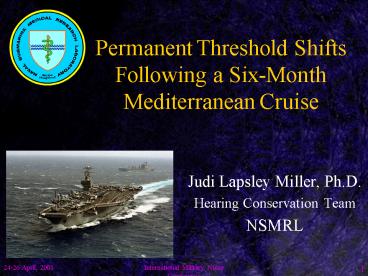Permanent Threshold Shifts Following a SixMonth Mediterranean Cruise - PowerPoint PPT Presentation
1 / 13
Title:
Permanent Threshold Shifts Following a SixMonth Mediterranean Cruise
Description:
Mainly tested Air, Engineering, and Reactor Departments. 24-26 April, 2001 ... This research was funded by the Office of Naval Research ... – PowerPoint PPT presentation
Number of Views:34
Avg rating:3.0/5.0
Title: Permanent Threshold Shifts Following a SixMonth Mediterranean Cruise
1
Permanent Threshold Shifts Following a Six-Month
Mediterranean Cruise
- Judi Lapsley Miller, Ph.D.
- Hearing Conservation Team
- NSMRL
2
Changes in Hearing
- What happened to sailors hearing on the USS
Dwight D. Eisenhower (CVN69) after one 6-month
deployment? - Are sailors in some Departments and Divisions
more at risk for significant hearing changes than
others?
3
NSMRL Study 1999-2000
- Measured hearing and otoacoustic emissions before
and after 6 month deployment - Enrolled 401 sailors
- 339 sailors completed the study
- Mainly tested Air, Engineering, and Reactor
Departments
4
Study Time Line
Noise Exposed Group
Confirmationaudiogram for shifts
PRE-TESTaudiogram
POST-TESTaudiogram
Control Group (no noise exposure)
PRE-TESTaudiogram
POST-TESTaudiogram
5
Significant Threshold Shifts
- Navy criteria
- 15 dB shift at 1, 2, 3, or 4 kHz
- average 10 dB shift at 2, 3, and 4 kHz
- Empirical criteria (based on control group)
- 15 dB shift at 1, 2, 3 kHz, or 20 dB at 4kHz
- multi-frequencies at 2,3 or 3,4 or 2,3,4kHz
6
Significant Threshold Shifts
- 38 sailors (11.2) had significant changes in
hearing - 15 sailors (18 ears) had permanent changes
- 2 sailors (2 ears) had temporary changes
- 22 sailors (25 ears) were post hoc classified
with significant changes
7
Sailors with significant threshold shifts (STS)
by Department
8
Sailors with STS by Division
Shown are only divisions where more than 20
subjects were tested
9
Sailors with confirmed Permanent Threshold Shifts
by Department
10
Sailors with confirmed PTS by Division
Shown are only divisions where more than 20
subjects were tested
11
PTS in Sailor from Reactor Dept
- Hearing Loss at 6kHz pre and post test
- Multi-frequency permanent threshold shift at
2,3,4kHz in left ear - Age 26
- Length of service4 years
12
Summary
- Even after only one deployment, over 11 of
sailors had significant changes in hearing - The Reactor Propulsion Division appeared to be
most at risk for STS and PTS - Results to be used cautiously
- numbers are small and subject to sampling
variability - subjects were not randomly selected across
Departments and Divisions
13
Acknowledgements
- This research was funded by the Office of Naval
Research - Thanks to the crew of the USS Eisenhower for
their cooperation and help with our study - Thanks to the Hearing Conservation Team at NSMRL
for helping prepare this presentation































